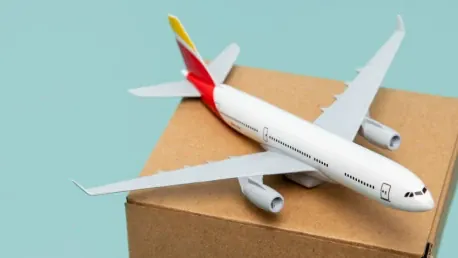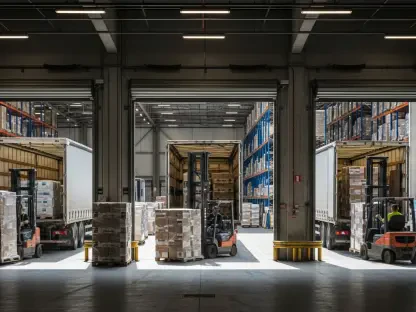Amidst the upheaval in the aviation industry due to the Covid-19 pandemic, SmartLynx Airlines took a decisive step to realign its business focus from passenger transport to air cargo operations. This strategic pivot not only facilitated the airline’s survival during a turbulent period but also laid the groundwork for sustained growth and adaptability. The evolution in the air cargo sector is marked by transformative technological advancements and shifting market demands, largely influenced by the rise of e-commerce and changes in the aviation landscape.
A Strategic Pivot in Response to Market Dynamics
The aviation landscape has undergone dramatic changes, significantly influenced by the rise of e-commerce and evolving market demands. SmartLynx Airlines, which initially focused on passenger transport from the early 1990s, redefined its operations in 2020. CEO Edvinas Demenius explained that the transition to cargo was part of a broader strategy for diversification and growth, rather than just a reaction to the pandemic. Recognizing the permanent shift in market dynamics, SmartLynx incorporated Airbus A321 freighters into their fleet. By becoming the first to offer the A321F model, the airline positioned itself advantageously to meet the demands of logistics giants like DHL. This move was game-changing, creating new business opportunities and ensuring long-term resilience.
In response to this new direction, SmartLynx’s pivot to cargo operations marked a significant milestone in the company’s history. Edvinas Demenius emphasized that this shift was not merely a temporary response to the pandemic but a strategic decision aimed at long-term diversification and growth. This strategic move allowed SmartLynx to capitalize on emerging market opportunities and created a robust foundation for future success. The transition to cargo operations provided the airline with the flexibility to adapt to market changes while exploring innovative ways to enhance its operational efficiency.
Expansion and Diversification of Fleet
A critical component of SmartLynx’s successful transformation lies in its strategic expansion and diversification of its fleet. Today, the airline operates 13 A321P2F freighters and plans to acquire a 14th by the end of 2024. The targeted acquisition and deployment of the right equipment have allowed SmartLynx to secure significant partnerships early on, setting the stage for lasting growth. The addition of Airbus A321 freighters to their fleet was not an arbitrary decision but a calculated move to address the growing demand in the air cargo sector. The A321F’s design is optimized for efficient short-haul operations, with a capacity of 27,000 kilograms and 14 container positions, making it an ideal asset for maintaining a competitive edge. This strategic expansion aligns with the company’s long-term vision and enables it to cater to the logistical needs of its partners effectively.
Despite the stabilization of the initial spike in demand from the pandemic, SmartLynx continues to experience consistent growth in various regions. This steady upward trajectory is a testament to the company’s ability to adapt to changing market conditions and its commitment to delivering exceptional service. The airline’s ability to incorporate the right equipment at the right time has been a key factor in its ability to secure significant partnerships early on, thereby ensuring lasting growth. The strategic expansion and diversification of its fleet have allowed SmartLynx to build a strong foundation for future success, positioning it favorably within the competitive air cargo market.
Embracing the E-commerce Boom
E-commerce is becoming a significant driver in the air cargo sector, projected to account for a third of all air cargo volumes soon. Anticipating this trend, SmartLynx identified the e-commerce boom as a key demand driver when they expanded into the freighter market. Although the initial surge from the pandemic has leveled off, demand for newer aircraft and technologies continues to grow, fueling the sector. Recent data from the International Air Transport Association (IATA) indicates a global year-on-year increase in air cargo demand by 13.4% in the first half of 2024. SmartLynx, with its expanding freighter operations, aims to capitalize on this trend and extend its geographic reach over the next three to five years.
The airline has been proactive in recognizing the significance of e-commerce as a major driver of demand within the air cargo sector. This foresight has enabled SmartLynx to strategically position itself to leverage the opportunities presented by this growing market. The company’s expansion into the freighter market was not just a response to immediate market conditions but a carefully considered move to address long-term growth opportunities. By investing in newer, more efficient aircraft and leveraging advanced technologies, SmartLynx remains well-positioned to meet the evolving needs of the e-commerce sector. This strategic foresight, coupled with a commitment to operational excellence, ensures that the airline will continue to thrive in the dynamic air cargo landscape.
Leveraging Technological Advancements
Technological innovation is at the core of SmartLynx’s operational strategy. The airline has prioritized the integration of digital technologies to optimize efficiency and enhance customer service. Advanced software systems for flight planning, weight and balance, and overall operational efficiency form the backbone of their operations. A standout technological advancement is the A321F’s automated loading system, which allows for a complete turnaround in just 40 minutes. This capability is particularly crucial for the express freight market, making SmartLynx a preferred partner for logistics companies.
Additionally, SmartLynx demonstrates a proactive approach in employee training, using advanced training programs and simulation technologies to ensure that their staff remains ahead of industry standards. Well-prepared employees contribute significantly to more effective operations, reflecting a holistic approach to staying competitive. This proactive training ensures that the airline can maintain its high standards of reliability and efficiency, which are key to its expanding business partnerships and market reputation. The integration of cutting-edge technologies and a commitment to continuous improvement underscores SmartLynx’s dedication to being a leader in the air cargo industry.
Navigating Market Challenges
Operating a modern and fuel-efficient fleet designed for varying market conditions, SmartLynx demonstrates adaptability amidst challenges such as intense competition in the European cargo market and a global pilot shortage. CEO Demenius acknowledges the competitive nature of the freighter market, which often pressures yields downward, but remains optimistic about identifying and exploiting opportunities for efficiency and performance. SmartLynx’s active engagement with various clients enables it to stay responsive to market demands and optimize its operations continually. The company’s ability to navigate challenges and exploit opportunities is a testament to its strategic vision and operational excellence.
This adaptability and resilience are critical in a competitive and rapidly changing market environment. SmartLynx’s commitment to maintaining a modern and fuel-efficient fleet, coupled with its proactive approach to client engagement, positions the airline to capitalize on opportunities while mitigating potential risks. The company’s ability to navigate market challenges effectively ensures that it can continue to deliver value to its clients and shareholders while maintaining its competitive edge. This strategic approach, combined with a focus on operational excellence, underscores SmartLynx’s commitment to long-term success in the air cargo industry.
Commitment to Sustainability
Amid the upheaval in the aviation industry caused by the Covid-19 pandemic, SmartLynx Airlines made a bold decision to shift its business focus from passenger transport to air cargo operations. This strategic move was not only a survival tactic during a challenging time but also a foundation for future growth and flexibility. The air cargo industry is undergoing significant changes, driven by technological advancements and evolving market needs. The rise of e-commerce has played a substantial role in these changes, reshaping the aviation sector. As e-commerce continues to grow, the demand for air cargo services increases, prompting airlines like SmartLynx to adapt. By realigning its business model, SmartLynx positioned itself to better navigate the changing aviation landscape. This pivot enabled the airline to leverage new opportunities in the air cargo market while ensuring its long-term viability. The Covid-19 pandemic, despite its challenges, acted as a catalyst for innovation and strategic realignment within the company, ensuring it remained competitive and resilient in an ever-changing industry.









